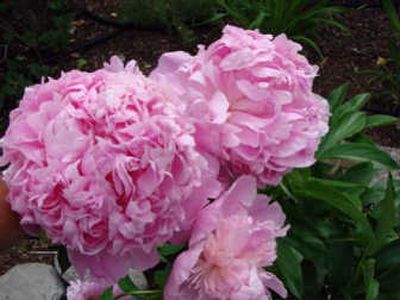New gardener can’t go wrong with lilacs, poppies

In the barren landscape of an old homestead, a discerning eye can make out where the house once stood by the twisted branches of neglected trees and shrubs. Yet, if you take the time to really look, you’ll see the lilac bushes are lush and blooming without any care.
On a busy stretch of Trent Avenue, nestled among the stark industrial buildings, stands a bright patch of orange oriental poppies – stubbornly standing up against the hot wind of a vacant field. Who’s to say why or when they were planted, but they return each year without any human encouragement.
If you think about it, these surviving plants send out a message. Regardless of conditions, they are hardy species that will come back each year – even if they are abandoned or neglected. To a gardener, there is an additional message; these are easy to grow. These types of plants like our climate and, once established, seem to live forever.
It’s OK – and one of the keys to successful gardening – to start with something easy. Planting something that is practically guaranteed to grow gives you a head start on learning how to garden. Because, even though these will be faithful additions to your garden, you simply cannot put them in with the idea that you will neglect and abuse them. Sure, you’re taking a shortcut by planting a sure-thing, but you still need to learn what to do. And with proper care, everything will thrive.
Beside lilacs and oriental poppies, peonies are another plant that will return each year. Other easy shrubs are mock orange, serviceberry or ninebark – the latter two are native to the area. Easy perennials to grow are daylily, iris and Shasta daisy. If you’d like to grow vegetables, spaghetti squash and pole beans are quite simple. Basil and chives are good herbs to start with – and can be started by seed quite easily. And for annual flowers, you can’t go wrong with some cosmos and zinnia.
Whatever you decide to plant, be sure to do the research on how to grow the plants. As always, chose the right place for the right plant – providing it with the sun or shade exposure it desires. Prepare the soil for planting – amending the soil and digging the hole appropriate to the size of the plant. Plant seeds according to the directions on the seed packet and follow instructions for thinning. For shrubs and perennials, protect them well the first few winters and regularly monitor their progress during the growing season, so you’ll be able to tell if there is a problem. Plan on watering all new plantings well for the first couple of years to help them get established.
Once you have succeeded with your gardening, you will have the courage to plant something that demands more attention – step it up a bit. That’s how we all started. But for now, plant a peony. And it will be here for your grandchildren’s grandchildren to enjoy.